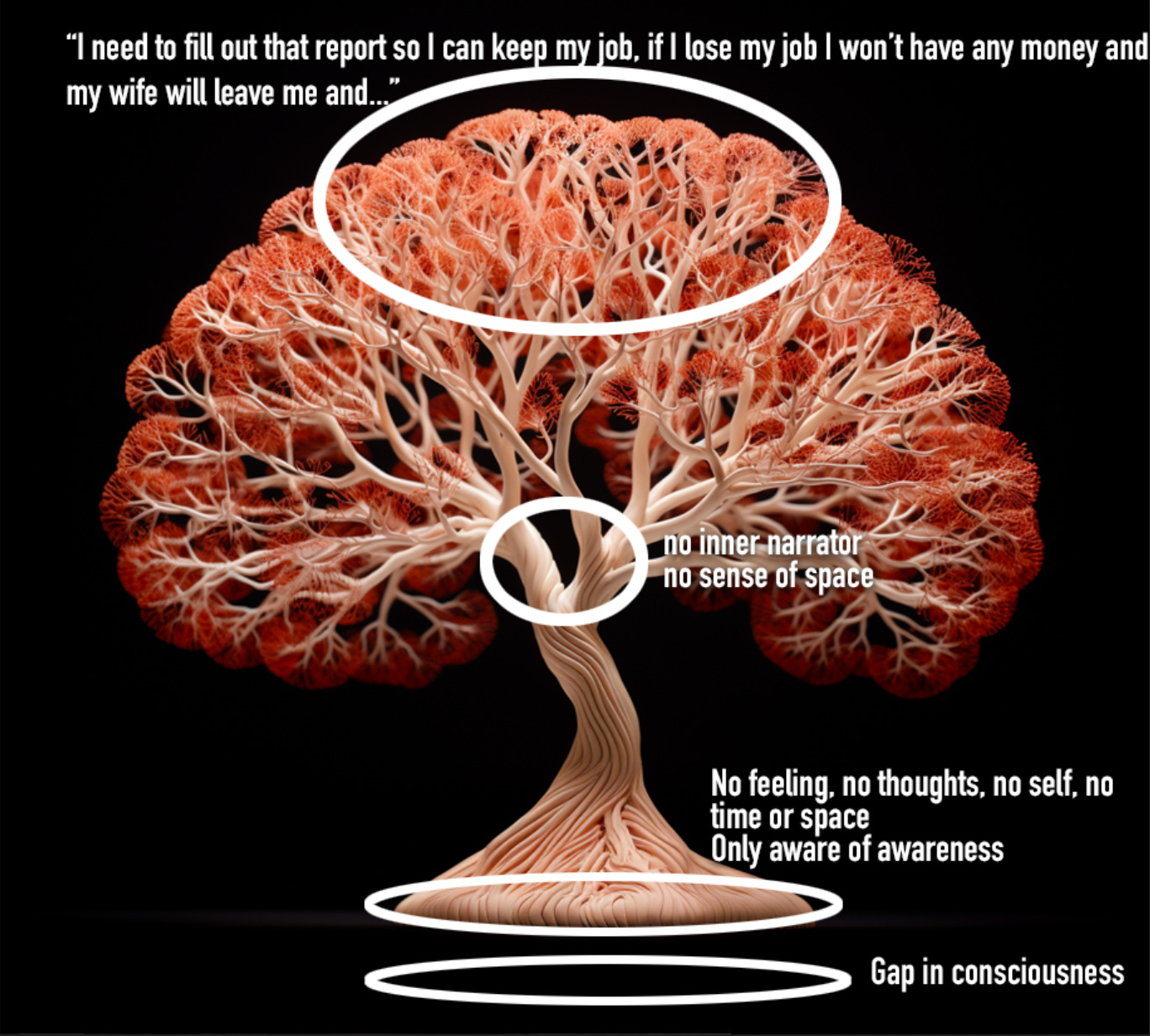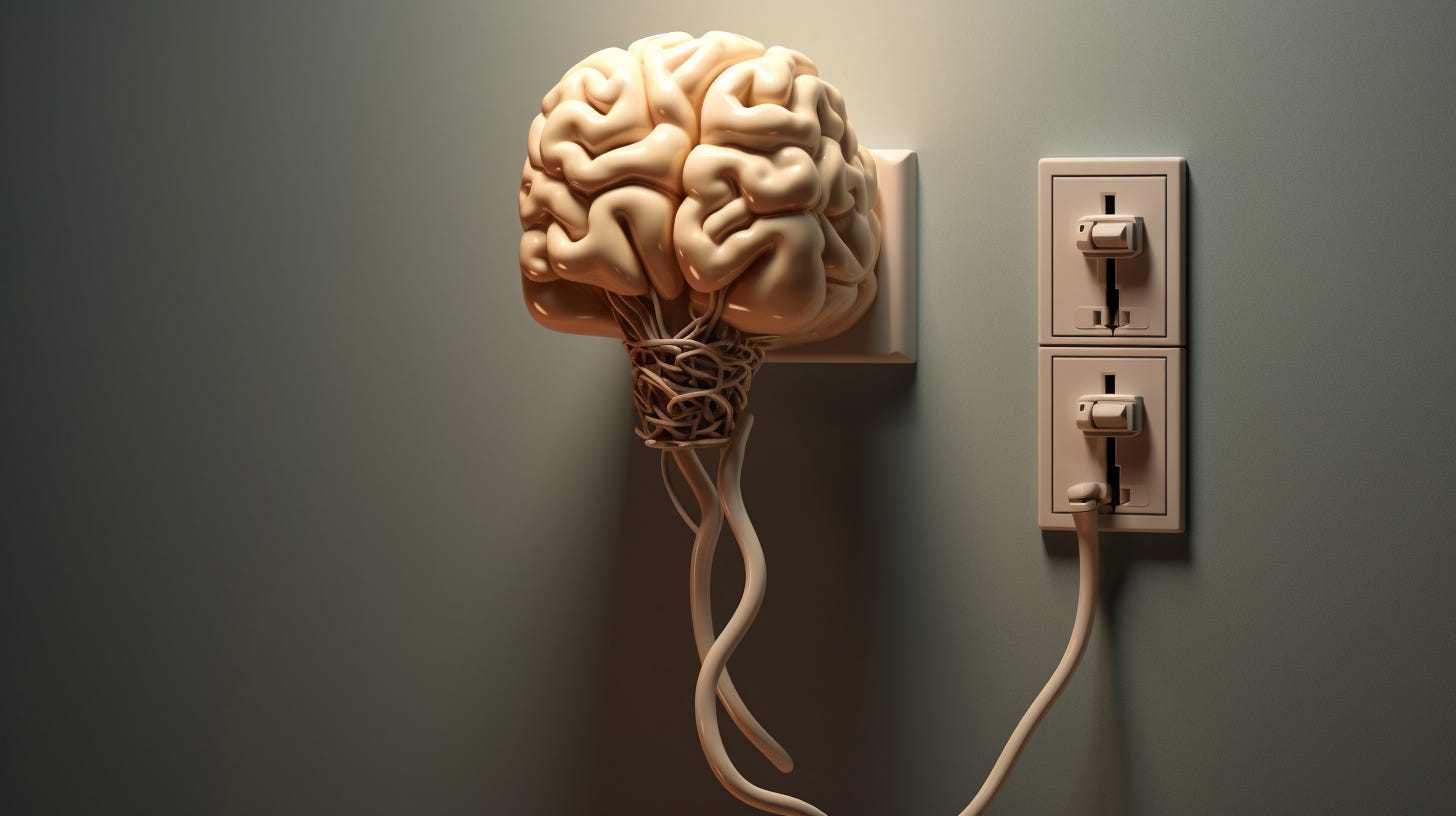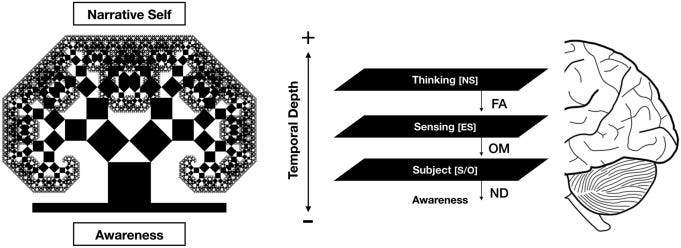Why the Mind makes you Suffer
Neuroscience and Enlightenment explain the mind's dissatisfaction with reality
Want to know how to get enlightened?
Grab a Paid Subscription to my Substack and I’ll let you in on the secret for just $5!
Just kidding. This post is free.
To have an enlightenment experience, all you have to do is:
(1) Enter a deep meditative state that gradually reduces mental activity. You’ll need to turn off concepts like your inner narrator, a sense of space, a sense of time, a sense of self and so on.
(2) Continue to meditate until you’re left with only the concept that you are ‘aware’ - that is, the only thing left to occupy your awareness is awareness itself.
*Pro tip: A deep disenchanting realization that all experiences in life are impermanent and never truly satisfying helps with this process.
(3) Remain in this state until even the awareness of awareness ceases. This will result in a complete cessation of consciousness.
(4) When consciousness ‘comes back online,’ you should be able to get a glimpse of how the mind actually operates. As the mind boots back up, you will get to see the step-by-step process of exactly how the mind forms itself.
(5) This should induce a never-before-fathomed visceral epiphany about the nature of your mind and reality. The mind will have to completely reconstruct an entirely new and permanent model of how the world works in light of this new information.
Congratulations! With your brand new model of reality, you will feel like you woke up after wandering in a kind of self-induced brain fog. Everything will feel very fresh as if you are seeing the world for the first time, because you kind of are. You are seeing the world through an entirely new mental model. After a while, that freshness will dissipate, but you will permanently experience the world slightly differently than before thanks to your mind’s new model of reality.
But don’t get too impressed with your self because there was no self in the first place, and there’s still a long road ahead of you to fully realizing the nature of reality. You just barely found route 66. Now you have to traverse it. You’ll have to repeat this ceasing of consciousness process many times to progress further.
The science on the ‘enlightening’ experience of turning off consciousness
Scientific exploration of the brain is starting to reveal glimpses into the precise sequence of events that lead to what several Buddhist traditions would call “enlightenment.”
This 2023 paper in the journal Progress in Brain Research describes this as a “meditation induced cessation,” which is essentially the intentional turning off or “momentary cut” of consciousness. This short circuiting of consciousness would lead to
a sense of clarity and freshness, as if everything is new or as if “seen for the first time.” Or put simply, cessation would result in an experience of the present moment that is less conditioned by past beliefs.
On the progress through meditation itself, they say:
Our core proposal is that meditation gradually reduces the temporal depth of processing in the predictive hierarchy by bringing the practitioner more and more into the here and now. …being fully immersed in the here and now may also occasion a radical shift in one’s ordinary sense of self-consciousness.
They even note an observable pattern of mental activity that may indicate when enlightenment experience is (close to) happening from an objective standpoint.
…[what occurs is] a reduction in functional connectivity that might give rise to a disintegration in the binding elements of consciousness, as evidenced by a reduction in alpha synchronization during cessation.
A reduction in ‘synchronization’ of the brain would be something like being able to hear someone speaking in your native language but not understand it. If you have desynchronized the faculty of the brain that receives audio information from the part that interprets it, you should be able to hear only the noise of language without understanding it.
How meditation leads to the cessation of consciousness
Have you ever had something devastating happen to you that completely wrecked your model of the world? You might have been carrying around the idea ‘I can utterly and absolutely trust my friend’ and then that friend swindles you out of thousands of dollars. Or perhaps someone is comfortably carrying the idea that ‘she’d never cheat on me’ and then they stumble on their partner’s text messages.
These kinds of experiences may rapidly force the person to update their model of the world to include this information. ‘I was 100% sure that this type of person with this kind of relationship with me could never do something like that.’ That model would need to be updated to include new predictions. ‘Something that I thought could never happen happened, so perhaps my entire set of predictions of how humans will act is incorrect and I need to update my model of human behavior.’
Let’s not fixate on negative experiences leading to newly formed models of the world. What if someone goes from ‘no way I could ever make more than $2000 a month,’ and then they make $10,000 in a month with their new business? Their updated model of their capabilities within the world would no longer include such limitations and would include new, optimistic predictions.
What about something more mind blowing? Most people don’t walk around with their brain making predictions about how their actions are going to suddenly lead to their death. The thought that ‘I could die at any minute’ (I hope) rarely viscerally crosses the average person’s mind. Then they may experience an entirely unexpected near death experience. Though they may not be able to put it into words, a fundamental update to their model of the world would likely occur.
Here’s an excerpt from a 2013 paper on the positive mental shifts from Near Death Experiences (NDEs):
Regardless of their cause, NDEs can permanently and dramatically alter the individual experiencer’s attitudes, beliefs, and values. ... A recent review of research into the characteristic changes following NDEs found the most commonly reported to be loss of fear of death; strengthened belief in life after death; feeling specially favored by God; a new sense of purpose or mission; heightened self-esteem; increased compassion and love for others; lessened concern for material gain, recognition, or status; greater desire to serve others; increased ability to express feelings; greater appreciation of, and zest for, life; increased focus on the present; deeper religious faith or heightened spirituality; search for knowledge; and greater appreciation for nature.
Meditation makes the mind less complicated
I recently caught up with neuroscientist and advanced meditator Dr. Ruben Laukkonen for an interview during his trip through Japan. His ability to explain concepts in a clear way from the intersection of his neuroscience expertise and personal experience with meditation made it a really fascinating interview. He was the author of the above 2023 paper and authored another 2021 one titled From many to (n)one: Meditation and the plasticity of the predictive mind.
(By the way, I recommend checking out his Substack here. He’s got a great post on a bizarre, beneficial side effect of a psychedelic trip induced by ketamine.)
My impression is that most people think of meditation as a way to improve their focus and emotional regulation. However, as discussed in my very first Substack post Is Enlightenment Real?, the deep end of meditation can elicit a much more robust alteration to the brain’s normal processing - for example deep meditative trance states can have the person experience a complete disappearance of the inner narrator or feeling as if their body has melted away.
Dr. Laukkonen’s paper lays out what is happening as one delves deeper into meditation.
We propose that practicing meditation therefore gradually reduces counterfactual temporally deep cognition, until all conceptual processing falls away, unveiling a state of pure awareness.
This state of “pure awareness” refers to having absolutely no content in the head except for being aware of the experience of being aware. So, the meditator would not have any concept of their body, space, desires, plans, they wouldn’t have concepts of how long they have been meditating, thoughts about what they ate for breakfast, what they need to do, itches on their body, pains in their neck - they would have no concept of time itself et cetera.
I think without experiences like my experience with the very potent psychedelic Ayahuasca in Costa Rica, something like reducing cognition such that you lose concepts would have been incredibly hard to ponder.

A couple years back, myself and a group of people had just finished a long group session tripping out on Ayahuasca. After the several hour session in darkness, most everyone headed outside to hang around the campfire. I got up from my mat, thinking my ‘trip’ was over as things felt more or less normal for me. I slowly made my way outside and it wasn’t until I sat down at the table that I realized my trip was far from over.
Halfway through an exchange with my buddy I traveled there with, I became exceedingly confused. My cognition was gradually reducing; aspects of my mind basically powered off. Complicated concepts powered off first and then simpler and simpler concepts powered off until I went from being unable to understand the words coming out of my friend’s mouth to having no concept of self. It wasn’t until I saw concepts coming back online that I realized what was happening. The thought process was something like this (not necessarily in this order, though):
・???
・There is a me. (Concept of the self back online)
・The “me” needs to be somewhere. (Concept of space back online)
・If there’s a somewhere, that means there are places other than this place.
…
・This person is making noises at me and that the noises had meaning. (Concept of language online)
・I recall suddenly asking my friend “Wait, do we all speak Japanese?” The concept of other languages came back on.
・I recall pondering how I got there and realized that “money” was a thing because I had to pay for services to get to Costa Rica.
・At some point, probably much earlier in this process, I was kind of frightened when a more complex concepts associated with ‘time’* partially came back online. I realized there was a now but also a ‘later.’ But how far did into the ‘later’ did this go on for? I had no idea. So, I had this scary feeling that the confusing experience could just continue indefinitely.
*Note: The concept of time in general was likely the very last to power off and the first to power back on, but I can’t say if I understood this clearly in the moment that it was happening.
Then the concepts powered back off one by one and then powered back up one by one multiple times in a cycle. It was all very confusing, frightening and exceedingly embarrassing each time the concept of ‘other people,’ the concept of ‘looking at me’ and the concept of ‘weird behavior’ came back online.

Part of what of Dr. Laukkonen’s paper is suggesting is that you can power off concepts like this except completely sober - through meditation.
Meditators, even in laboratory settings, report that aspects of experience that we often take to be stable and unchanging, such as time, space, and self, can be modulated in profound ways.
So, why would meditators want to turn off mind concepts?
The paper highlights Karl Friston’s Free Energy Principle as an effective way to understand how the mind works. The Free Energy Principle basically says that much of what the brain does is constantly predict how the world is going to operate based on past experience.
Predicting is a very core component of how the mind works, so let’s break this down.
Latent in every conscious action is a sort of ‘I am going to do X because I predict Y will happen.’ The brain is constantly trying to improve its ability to produce actions that will move you closer to a predicted state, you could also say a desired state.
To put this a bit more accurately, the brain actually makes a prediction and then begins moving your body and interacting with the world to make the actual reality closer to the predicted state. You have a desired or predicted outcome in mind and you do things to get to that outcome.
As Dr. Laukkonen put it in a message to me, it works something like this:
“I predict x state that is not my current state.
In order to reduce the error incurred by that prediction,
I fulfill actions to make my projected state x come true.
Thereby reducing the difference between my current state and the expected state.”
As his paper says:
Thus, in this framework, perception, action and everything in between, are constructed through predictive models that have previously come to reliably reduce errors in prediction. Therefore, past experience is a pervasive factor underlying all mental activity.
A prediction error just means things are not how you want them to be. Reducing errors in prediction is basically a fancy way of saying making things more like how you want them to be.
The reason this is interesting is because it shows that our consciousness always operating in terms of reducing prediction error. We experience reality in terms of predictions and prediction errors. Consciousness doesn’t just process the entire world indiscriminately - there’s simply too much going on. Rather, it does something much more efficient and effective: it creates a prediction (a desired state) and then constrains the entire world down to the information relevant to helping you get closer to that desired state (reduce prediction error.)
Focusing on minimizing prediction errors is computationally much less expensive than processing a complex temporally layered gamut of interoceptive and exteroceptive input in every instance.
So here’s the thing: What do we experience prediction error as? Well, again, a prediction error is essentially an undesired state. If you are in an undesired state, it means you are left wanting, frustrated, unsatisfied. It is craving - a key concept in Buddhism. Craving (taṇhā) arises simultaneously with dissatisfaction (dukkha).
This predictive nature of the mind means that your mind’s core operating principle is that of craving and dissatisfaction.
If you’ve heard anything about Buddhism, you may have heard that that ‘craving is the origin of suffering’ and so ‘life is suffering.’ However, I think suffering is too strong a word. The pali word dukkha simply means that which is unstable - something like a wheel with an axle that isn’t quite in the center so as you move along you’re slightly annoyingly bumping around with each revolution. So while life can have immense suffering, I think it’s something more simple like ‘things are never just right,’ or ‘no experience in life is ever completely satisfying.’
A complete lack of dissatisfaction would mean no reason to act or even experience mental processes.
Well … that kinda sucks. This leaves us with three questions:
(1) Is it possible to have a truly satisfying experience?
(2) If so, how do we get there?
(3) Can we change this predictive mind in a way to make it less burdened with dissatisfaction?
But before we answer those we need to answer…
What is the self?
The paper later lays out that:
“First, like all other aspects of mind, the self must also be a construction, built out of hierarchical models driven by past experience. …One cannot predict the sensory outcomes of future actions without representing oneself in those actions as a hidden cause of changes in sensory output.”
That is, the concept of a self is merely a tool for the brain to act effectively in the world. This self is constructed based on updating your mental model based on how the world works. Simply put the brain works better if it creates the illusion that a “self” exists separate from the world. For example, it can obviously make better predictions about how cats behave if it can realize that cats don’t will petting entities into existence, but rather a self separate from the cat (you) was the reason the cat came to be pet.
Is there a permanent self, something like a permanent soul that ‘wears’ and animates the body and mind or is the self simply a useful pattern of mental activity that scribes a type of signature onto each action, intention and thought you have?
What if the operations of the body and mind just unfold?
・Unconscious processes indicate the body is insufficiently hydrated.
・The concept of thirst arises in the mind.
・A prediction for the best action to resolve this thirst appears in the mind in the form of an image of a water bottle.
・This triggers an intention to move the arm.
・The arm moves.
・The conditions for thirst are resolved.
・The concept of thirst ceases to arise in the mind.
Theoretically all that mental activity could happen without you conceiving of your having a self, but the mind found it more useful to have separate mental processes that slap the “self” label onto all that mental activity.
・The concept of thirst arises in the mind. (My mind.)
・I prediction for the best action to resolve this thirst appears in the mind in the form of an image of a water bottle. (My prediction.)
・This triggers an intention to move my arm. (My intention.)
・My arm moves. (I moved it.)
・My thirst is resolved. (My satisfaction.)
・I am no longer thirsty. (My mind.)
The many to (n)one paper differentiates between the narrative and experiencing self, explaining that the Default Mode Network (DMN) of the brain is likely to be the key source of the narrative self. The DMN is associated with mind wandering. That is, pondering the past and future. A paper titled A Wandering Mind is an Unhappy Mind suggests that, as you might guess, such DMN activity associated mind wandering is associated with unhappiness.
The idea is that lessening activity in the Default Mode Network would indicate a more content mind that is more focused on the present moment.
I interviewed highly advanced meditator Daniel Ingram on the channel about 8 months ago. In the interview he said that he no longer has the sense of a self. In Daniel’s words: "So what permanently stopped was the mind's obsession with trying to figure out which of these transient sensations was a stable self. 18 and a bit years, it hasn't seemed to have done that again." When neuroscientist Dr. Judd Brewer and his team put Daniel into a brain scanner, they found that his Default Mode Network seemed to be ‘off’* by default. It took Daniel a little while to figure out how to ‘activate’ the Default Mode Network, something that is normally very active in the average person.
*Note: It’s probably more accurate to say something like ‘activity in the Default Mode Network was drastically reduced.’
By the way, as the many to (n)one paper explains, “…the human DMN can be considered to sit at the top end—or center—of a uniquely deep hierarchical system…” Remember the pythagoras tree from before? It seems to be the Default Mode Network is situated where the tree is most complex.
This is very interesting in light of the fact that the first surprising transformation in the mind in the earlier stages of the TWIM meditation technique (the technique I happened to take to) was … no longer hearing a voice in my head. My inner narrator at some point finally went quiet. (What’s funny is I felt that it was still trying to disturb my peace, but it just couldn’t - something like trying to wiggle a totally numb toe.) Note: There was still plenty going on in my mind at this point - images, blotches of light, contentless noises, could feel glimpses of pain in my neck et cetera but no rumination or anxious projections about what I need to do next week.
So now, let’s ponder this quote from the many to (n)one paper:
“Only through action can the organism dissociate between self (sensory changes caused by oneself) and non-self (sensory changes caused by the environment), by comparing the incoming sensory input to action-based predicted sensory input. Thus, self-awareness necessarily relies on models with temporal depth, that are capable of inferring the (not yet present) consequences of action.”
This might sound dense, but I think it suggests something very interesting. What the author seems to be saying here is that we should assume that complete focus on the here and now would dissolve and necessity of a self and would thus dissolve the felt experience of a self. The “self” is pattern of mental activity constructed for the useful purpose of interpreting the past and the future. Thus, a complete focus on the here and now suppresses that pattern of mental activity
Dr. Laukkonen clarified this in a message to me:
“To conceptualise a self demands that you integrate information over time because the existence of “you” or “I” implies something that is consistent across moments.
To identify such a regularity demands that you project away from now to a past moment and a future moment within which you identify the regularity of this “self”.
Thus, to be truly here and now is to not be capable of identifying such a regularity.”
A truly satisfying experience
The Buddha taught that all experiences, including thoughts and emotions, are marked by three characteristics:
impermanence (anicca)
dissatisfaction (dukkha)
not-self (anatta)
If these are linked, then maybe all we have to to do get rid of of that dukkha (dissatisfaction) is to realize the reality and break the illusion of there being a stable self.
As we established already, the way to do this is to achieve a complete focus on the here and now such that the concept of a self cannot conceptually exist because without conceiving of other moments, the ‘self’ cannot be cognized.
So let’s ponder our three questions again:
(1) Is it possible to have a truly satisfying experience?
The way to have a truly satisfying experience is quite straightforward if you consider the predictive nature of the mind. The mind generates a prediction (a desired state) which immediately gives rise to prediction error (dissatisfaction with not being at the desired state). So the way to be truly satisfied is to ‘turn off’ predictions. The mind needs to to disengage from anticipatory processes.
The way to further and further reduce predictions and therefore reduce prediction error is then to power down the conceptual frameworks of the mind and focus on the here and now.
Dr. Laukkonen clarified in a message to me:
“If you’re only predicting the content of the here and now or very concrete sensations then there’s little error relative to predicting moments outside of the now, which are by definition full of error
And being full of error by predicting moments that don’t exist is to give rise to craving to reduce that error
The paradox being that the error is self-generated.
And the realisation being that you can just stop self-generating suffering”
(2) How do we get there?
Well, as the paper says: meditate.
Our main contention is that FA, OM and ND meditation gradually bring the practitioner more and more into the present moment
The paper explores three techniques:
Focused Attention - This is probably what comes to most people’s mind when they think of meditation. You focus on one particular sensation - most practices use the breath.
Open Monitoring - This is almost the opposite of Focused Attention but ironically, Focused Attention practice is usually used to better focus the practitioner on the here and now so they can be more successful at Open Monitoring. Open Monitoring is essentially where you try not to hold onto any one sensation or experience and just observe the experiences that arrive in your field of awareness non-judgmentally. It’s about what you’re not doing. You’re just sitting there but you don’t cling onto any thoughts or sensations that come your way.
Non-Dual Awareness - The many to (n)one paper describes this as “[discovering] an awareness that is unchanging regardless of what happens in experience.” However, trying to ponder what exactly that means is counterproductive because “the duality between the subject and object is itself a conceptual model constructed from past experience.” In non-dual, you are trying to dissolve the the distinction between a self and object of experience.
Thus, one way to understand the nature of non-dual practice is as follows: creating the conditions that reduce ordinary cognition that normally ‘hides’ non-dual awareness.
(3) Can we change this predictive mind to make it less burdened with dissatisfaction?
Well, this is basically the cessation-induced update of the mind’s model of the world we discussed at the beginning. You might ‘get’ the concept that there is no self, but you haven’t ‘felt’ it. It’s like being told what a grape tastes like, but never having actuallty tasted it. By ceasing consciousness, viscerally realizing that there indeed is no self and being able to observe how the mind constructs your experience as well as the self, your grip on the self will be loosened and thus your susceptibility to suffering will be loosened.
Big thanks to Ruben Laukkonen for taking the time to clarify certain concepts in the paper for me. By the way, to avoid misrepresenting his paper, let me point out that mixed into this post are a few concepts from Buddhists texts (or what I’ve learned from Dhamma talks) that were not explicitly mentioned in the paper. He just published his second entry on his Substack: Why do meditators go in caves? It’s a great read. You can also find him on Twitter and his website rubenlaukkonen.com

















I normally enjoy your articles in general, but this topic matter and style is why I switched to a paid subscription. Thank you for the excellent presentation of material and synthesis into something greater.
oh my God Joseph
please know the impact you have in peoples lives
i know that your ego is lowered with so much meditation but you inspired me